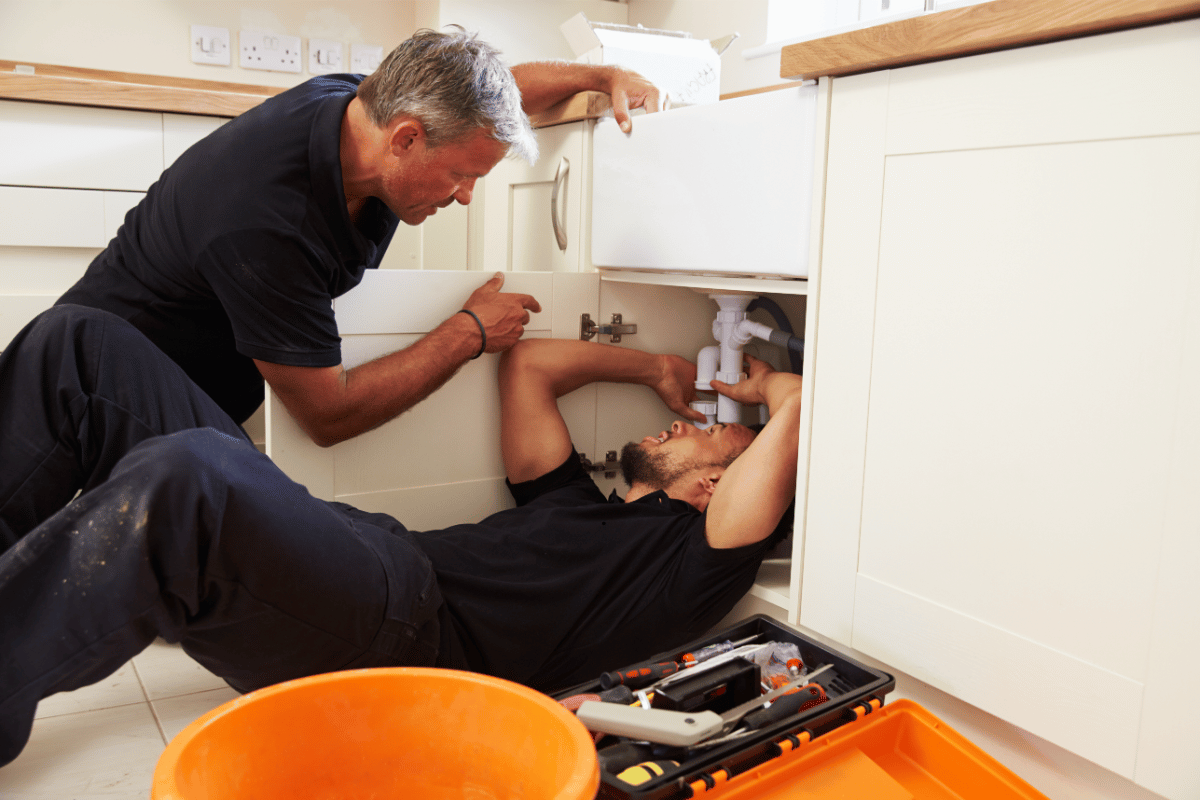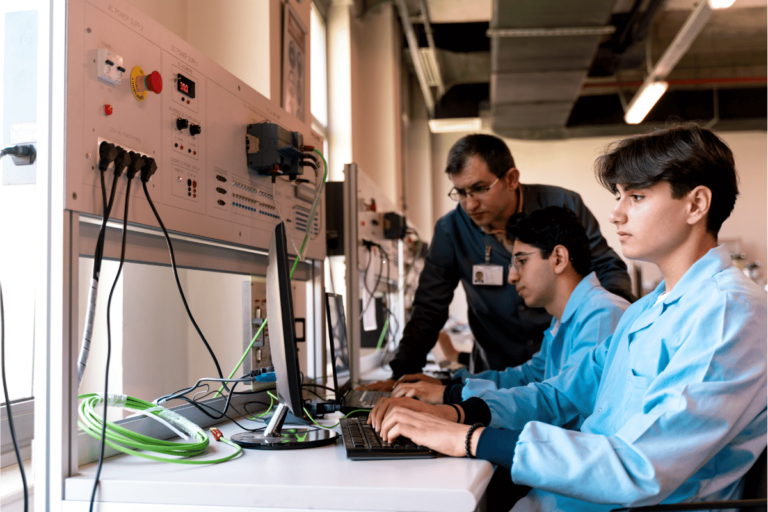Plumbing Vocational Training
Want to dive into the plumbing world? You need more than just a wrench and a can-do attitude. Vocational training is your ticket to mastering the trade. Let’s break down the must-have certificates and skills every plumber needs.
Must-Have Certificates for Plumbers
First up, the CPC32420 Certificate III in Plumbing. Think of this as Plumbing 101. It’s your go-to for learning how to install plumbing systems, gas appliances, and services. You’ll cover everything from plumbing regulations to safety procedures and tool usage.
Once you’ve nailed that, it’s time to level up with the CPC40920 Certificate IV in Plumbing and Services. This one’s for the big leagues. It dives into advanced plumbing skills and knowledge, prepping you for VBA (Victorian Building Authority) plumbing registration. With this certificate, you’ll get into the nitty-gritty of plumbing systems, hydraulic services, and sustainable practices.
These certificates aren’t just pieces of paper; they’re your golden tickets to a solid career in plumbing. They give you the confidence and qualifications to tackle any plumbing job and open doors for career growth. Curious about where to get started? Check out our guide on vocational training schools.
Skills Every Plumber Needs
Certificates are great, but skills are where the rubber meets the road. Here’s what you need to master:
- Soldering: Joining metal pipes isn’t just about sticking them together. It takes precision, the right materials, and a steady hand.
- Pipefitting: Measure twice, cut once. Proper pipefitting ensures your plumbing system is leak-free and efficient.
- Drain Cleaning: Clogged drains are a plumber’s bread and butter. Know your way around drain snakes and hydro jetting equipment to keep things flowing smoothly.
- Piping Installation: Whether it’s water supply lines, drainage systems, or gas lines, you need to install them right. Precision and secure connections are key.
- Troubleshooting: When things go wrong, you need to figure out why and fix it fast. Strong problem-solving skills are a must.
- Customer Service: You’re not just fixing pipes; you’re dealing with people. Good communication and professionalism go a long way.
- Admin Skills: From keeping records to creating estimates, a bit of paperwork is part of the job. Organization and basic computer skills help.
- Physical Fitness: Plumbing can be tough on the body. Staying fit helps you handle the physical demands, like lifting heavy objects and working in tight spaces.
Master these skills, and you’ll be a plumbing pro in no time. Plus, keep learning and stay updated on the latest techniques and technologies to keep your edge.
Vocational training in plumbing gives you the knowledge, hands-on experience, and skills you need to succeed. Whether you’re starting with an apprenticeship or diving into formal courses, you’ll get the expertise to build a rewarding career. Ready to get started? Check out our article on vocational training programs for all the details.
How to Become a Plumber
Thinking about becoming a plumber? There are a couple of main ways to get the skills and qualifications you need: apprenticeships and vocational schools. Plus, you’ll need to get licensed and certified to go pro.
Apprenticeship vs. Vocational School
Apprenticeships are the classic way to become a plumber. They usually take four to five years and mix hands-on work with classroom learning. You’ll need to clock in at least 2,000 hours on the job and spend some time in the classroom each year.
During an apprenticeship, you’ll work with seasoned pros who’ll show you the ropes. This real-world training is gold. Many trade unions and plumbing contractors offer these programs, and they often come with perks like mentorship and job placement help, especially for women, people of color, and veterans.
Vocational schools are another way to go. They offer certificates, diplomas, and associate degrees in plumbing. These programs can last from a few months to two years, depending on how intense they are (Build Stream). Vocational schools give you the book smarts and hands-on skills you need to get started in plumbing.
By going to a vocational school, you’ll get structured training and practical experience. These programs are designed to prep you for entry-level jobs and apprenticeships. Pre-apprenticeship programs at these schools can take anywhere from four to 24 months.
Choosing between an apprenticeship and a vocational school depends on what you want and what’s available near you. Apprenticeships give you lots of hands-on experience and mentorship, while vocational schools offer focused training and can get you into the workforce faster. Do your homework to figure out which path is best for you.
Licensing and Certification
To become a pro plumber, you’ll need to get licensed and certified. The rules vary by state, but most places require a high school diploma or equivalent to start an apprenticeship or join a vocational school. After finishing your training, you can apply for a journeyman plumber license by paying a fee.
Once you’re a journeyman plumber, you can gain more experience and go for a master plumber license. Some states also offer special licenses for plumbers who work with natural gas or gas piping. Licensing makes sure you meet the standards to do your job safely and well.
Certifications can also boost your credentials. Various organizations offer certifications in areas like backflow prevention, green plumbing, or medical gas systems. These certifications show that you’re committed to your craft and can make you more attractive to clients and employers.
By going through an apprenticeship or vocational school and getting the necessary licenses and certifications, you’ll be well-prepared for a successful plumbing career. The mix of hands-on experience, book knowledge, and industry credentials will set you up to tackle the challenges and opportunities you’ll face in the field.
Employment and Salary Outlook
Thinking about diving into a plumbing career? Let’s break down what you can expect in terms of job opportunities and paychecks. Plumbers are the unsung heroes who keep our water flowing and our pipes in check, so their skills are always in demand.
Job Growth and Demand
The Bureau of Labor Statistics says jobs for plumbers, pipefitters, and steamfitters are set to grow by 2% from 2022 to 2032. That’s pretty much on par with other jobs out there. Why the growth? Well, more people means more homes and buildings, and old pipes don’t last forever. Plus, new construction and maintenance work keep the need for plumbers steady (Bureau of Labor Statistics, U.S. Department of Labor).
Each year, around 42,600 new plumbing jobs are expected to pop up. That’s a lot of openings! As seasoned plumbers hang up their wrenches, fresh faces will be needed to fill their boots. So, if you’re thinking about getting into plumbing, there’s a good chance you’ll find a spot.
Median Wage for Plumbers
In May 2023, the median annual wage for plumbers, pipefitters, and steamfitters was $61,550. To put it simply, half of the folks in this line of work made more than that, and half made less. The bottom 10% earned under $38,690, while the top 10% raked in over $103,140 (Bureau of Labor Statistics, U.S. Department of Labor).
Wages can swing based on where you work, how much experience you have, and what kind of plumbing you do. Got a knack for a niche area or extra certifications? You might see a fatter paycheck. As you climb the ladder and sharpen your skills, your earnings can grow too.
With steady job prospects and a solid median wage, plumbing offers a stable career path with good money on the table. Get the right training and certifications, and you’ll be set for a successful run in this field.
Curious about where to start with vocational training and certifications for plumbing? Check out our article on vocational training for plumbing.
Specialized Plumbing Courses
Thinking about diving into the plumbing trade? Specialized courses are your golden ticket. They arm you with the skills and certifications you need to make a splash in the plumbing world. Let’s break down what these courses offer and how they can fit into your busy life.
Training Programs and Certifications
Take the Plumbing Skills Training Course from the Indepth Research Institute (IRES), for example. This 5-day crash course covers everything from plumbing systems to pipefitting and drainage. It’s like a boot camp for future plumbers.
Finish the course, and you walk away with a certificate from IRES, backed by the National Industrial Training Authority (NITA). This isn’t just a piece of paper; it’s your ticket to better job prospects in the plumbing industry (InDepth Research).
These courses mix it up with presentations, hands-on exercises, online tutorials, and group projects. This blend of theory and practice ensures you get a well-rounded education in plumbing.
Course Offerings and Flexibility
Worried about fitting a course into your schedule? No sweat. Specialized plumbing courses like the one from IRES offer flexible dates. You can even request custom training sessions to suit your needs. This means you can learn without turning your life upside down.
Courses are taught in English, so you’ll need to be comfortable with the language to get the most out of them (InDepth Research). This ensures everyone’s on the same page and can follow along easily.
By signing up for these specialized plumbing courses, you’re setting yourself up for success. You’ll gain valuable skills, earn certifications that boost your job prospects, and enjoy the flexibility to learn on your terms. So why wait? Dive into a plumbing course and start building your future today.


